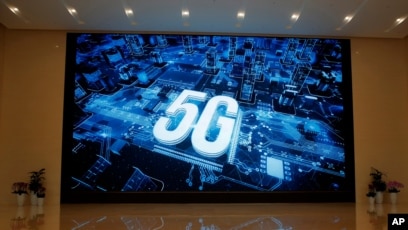September 17, 2022 3:07 AM

FILE – Visitors look at the Chinese military’s J-16D electronic warfare airplane during an air show, Sept. 29, 2021, in Zhuhai, China. Some observers are warning that the U.S. faces an uncertain future in which China and other nations could challenge its technological dominance.
At a gathering of current and former U.S. officials and private-sector executives Friday in Washington, concern was rampant that the United States has fallen behind China in the development of several key technologies, and that it faces an uncertain future in which other countries could challenge its historic dominance in the development of cutting-edge communications and computing technology.
The gathering was convened by the Special Competitive Studies Project, an effort spearheaded by former Google CEO Eric Schmidt, the stated purpose of which is “to ensure that America is positioned and organized to win the techno-economic competition between now and 2030, the critical window for shaping the future.”
Among attendees, the prevailing sentiment was that the nation’s ability to actually win that competition was under threat.
Dire predictions
A few days before the summit, the SCSP issued a report predicting what would happen if China became the global technological leader.
“Understanding the stakes requires imagining a world in which an authoritarian state controls the digital infrastructure, enjoys the dominant position in the world’s technology platforms, controls the means of production for critical technologies, and harnesses a new wave of general purpose technologies, like biotech and new energy technologies, to transform its society, economy and military,” the report said.

The report envisions a future where China, not the U.S., captures the trillions of dollars of income generated by the new technological advances and uses its leverage to make the case that autocracy, not democracy, is the superior form of government.
In the report’s grim vision, China promotes the concept of a “sovereign” internet, where individual countries limit the flow of information to their people, and where China develops and possibly controls the key technology supporting critical infrastructure in countries around the world.
Finally, the report warns that under such a scenario, the U.S. military would lose its technological lead over China and other competitors, and China might be in a position to cut off the supply of “microelectronics and other critical technology inputs.”
‘Nothing is inevitable’
In an address to the summit, White House national security adviser Jake Sullivan appeared to agree that the nation faces significant challenges in keeping pace with China in the development of new technology.
“We know that nothing is inevitable about maintaining America’s core strength and competitive advantage in the world,” Sullivan said. “And we know that it has to be renewed, revitalized and stewarded, and that is especially true when it comes to U.S. technological leadership.”
In China, he said, “we’re facing a competitor that is determined to overtake U.S. technology leadership and is willing to devote nearly limitless resources to do so.”

Sullivan also said, however, that President Joe Biden’s administration is aware of the threat and has been working to meet it. In particular, Sullivan noted the recent passage of the CHIPS Act, which directs more than $50 billion toward establishing advanced microchip fabrication facilities in the U.S.
“We’re making historically unprecedented investments, putting us back on track to lead the industries of the future,” Sullivan said. “We’re doubling down on our efforts to be a magnet for the world’s top technical talent. We’ve adapted our technology protection tools to new geopolitical realities. And most importantly, we’ve done this in a way that is inclusive, force multiplying and consistent with our values.”
Not ‘fast enough’
H.R. McMaster, a retired Army general who served as national security adviser during the Trump administration, appeared as a panelist at the conference. He said that while progress is being made, the pace needs to be quickened.
“It’s not going fast enough, because we’re so far behind, because there’s too many years of complacency based on flawed assumptions about the nature of the post-Cold War world,” McMaster said.
He called for a more active effort to block China’s technological advancement, saying, “We need export controls now, to prevent China from getting a differential advantage, [while] maintaining our competitive advantages.”
China has repeatedly criticized U.S. efforts to impede its technological advancement, an issue that Chinese Foreign Ministry spokesperson Mao Ning addressed this week when asked about U.S. export controls.
“What the U.S. is doing is purely ‘sci-tech hegemony,’ ” she said. “It seeks to use its technological prowess as an advantage to hobble and suppress the development of emerging markets and developing countries. While trumpeting a level playing field and a so-called ‘rules-based order,’ the U.S. cares only about ‘America first’ and believes might makes right. The U.S. probably hopes that China and the rest of the developing world will forever stay at the lower end of the industrial chain. This is not constructive.”
5G as a warning
A recurring theme at the event was the development of 5G wireless internet technology, a field in which Western countries, including the U.S., fell far behind China. With the benefit of favorable treatment from Beijing, Chinese firms, specifically Huawei, developed a dominant global position in the provision of 5G networking equipment.

Concerned that having Chinese-made equipment serve as the backbone of sensitive communications technology could create an espionage or security risk, the U.S. and some of its allies mounted a global campaign to block the installation of Huawei’s equipment, even if that meant significant delays in the rollout of 5G wireless service.
“The key message here is we need to make sure that what happened to us in 5G does not happen again,” said Schmidt. “I cannot say that more clearly. You do not want to work on platform technologies that you use every day that are dominated by nondemocratic, nonopen systems.”
Schmidt said that it would be difficult to stay ahead of China technologically, predicting that Beijing would “double down on competing in the areas that we care about,” including artificial intelligence, quantum computing, biotechnology and others.
Maintaining relations
Jon Huntsman, a former U.S. ambassador to China, said that Americans are generally uninformed about how far China is ahead of the United States in some technologies. Now the vice chairperson of Ford Motor Company, Huntsman said that in the development of electric vehicles, for example, China is at least five years ahead of the U.S.
He said that the U.S. must walk a fine line to catch up with China in some areas and to maintain its advantage in others. In particular, he stressed the need to retain person-to-person business and other relationships with the Chinese people.
“Decoupling our people is not a good thing,” he said. “We’ll wind up with China right where we are with Russia if we do that.” He added, “Decoupling is only going to create estrangement, misunderstandings and instability, globally, on the security side.”
Source: https://www.voanews.com/a/experts-warn-us-is-falling-behind-china-in-key-technologies/6751392.html
